Is Depop a Scam?
Laura Martisiute
Reading time: 9 minutes
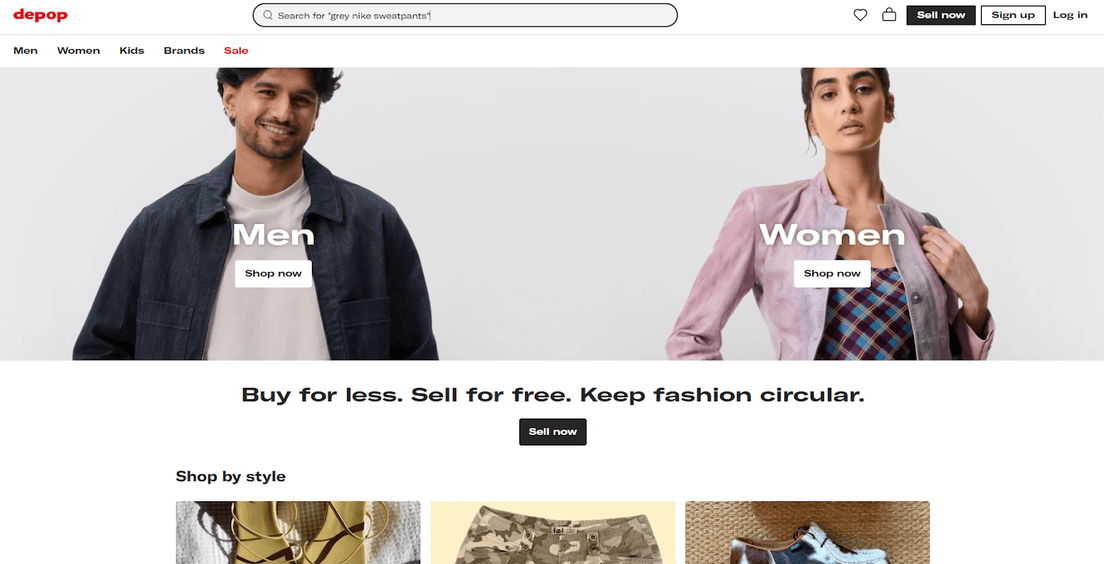
Table of Contents
If you’re thinking of using Depop, you need to know: Is Depop a scam?
Below, we explain whether Depop is a scam and discuss some steps you can take to improve your safety when shopping on this platform.
What Is Depop?
Depop is a platform where you can sell and buy new and used clothing items and accessories.
It describes itself as a “circular fashion marketplace.”
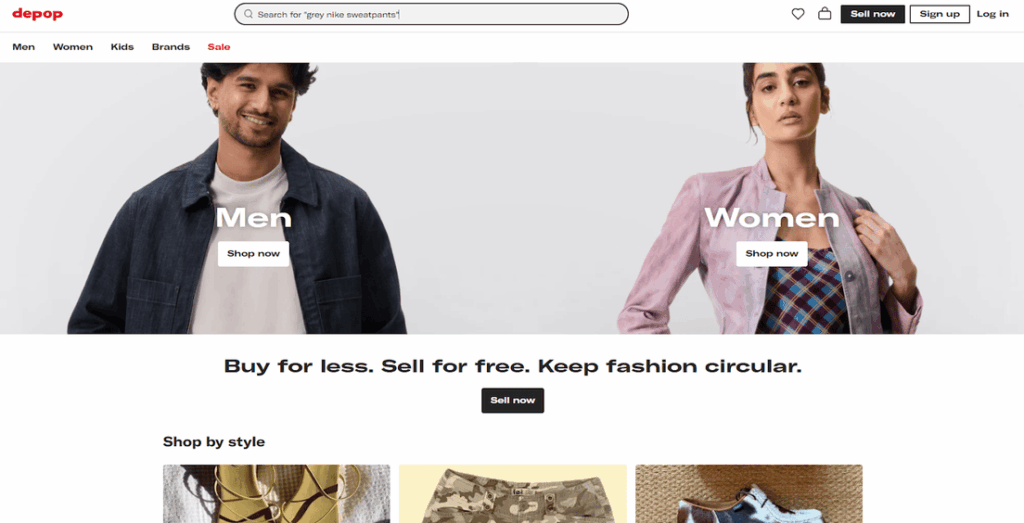
It was founded in 2011 and is currently owned by the online marketplace Etsy.
Depop users can browse listings posted by other users and follow sellers’ profiles.
Is Depop a Scam?
No, Depop is not a scam. It’s a legitimate social e-commerce marketplace.
However, it gets mixed reviews:
- 1.3 out of 5.0 stars on Trustpilot (from 6,769 reviews).
- 1.3 out of 5.0 stars on REVIEWS.io (from 174 reviews).
- 4.8 out of 5.0 stars on the App Store (from 518,571 ratings).
- 4.6 out of 5.0 stars on Google Play (from 84,128 ratings and 10m+ downloads).
In a 2024 survey by Which?, the independent consumer organization in the UK, Depop did not receive the best scores.
It was ranked as the eighth (out of nine) best marketplace for buying second-hand items online.
It was ranked the ninth (out of nine) best marketplace for selling second-hand items online.
Also in the Which? Survey:
- 33% of buyers said they complained to Depop’s customer service in the last two years, and most (86%) were happy with the dispute-raising process.
- 16% of Depop sellers surveyed said they complained to Depop’s customer service, and most (79%) were happy with the result.
Depop scams
As is the case with any marketplace where people buy and sell from each other directly (e.g., Poshmark), scams abound on the Depop platform.
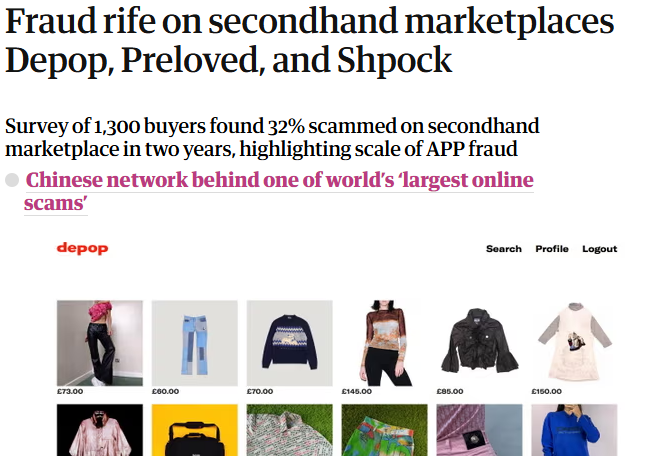
According to a Reddit list of the most common Depop scams, users should watch out for:
- Emails from “Depop” asking you to send money.
- Requests to trade items.
- Links in Depop messages (particularly from users who say they bought an item from you even though it doesn’t show up as sold in-app and ask you to mark the item as sold).
- Requests for a refund before you get the item back from them. It’s common for scammers to ask for a partial refund (they may say they’re not comfortable sending the item back otherwise). Don’t do it, as you’re likely to lose both the item and the partial refund.
The number one sign that you’re being targeted with a scam is the person asking you to move outside the Depop platform.
For example, they may ask you to send them more pictures off the platform or say their Depop account isn’t working.
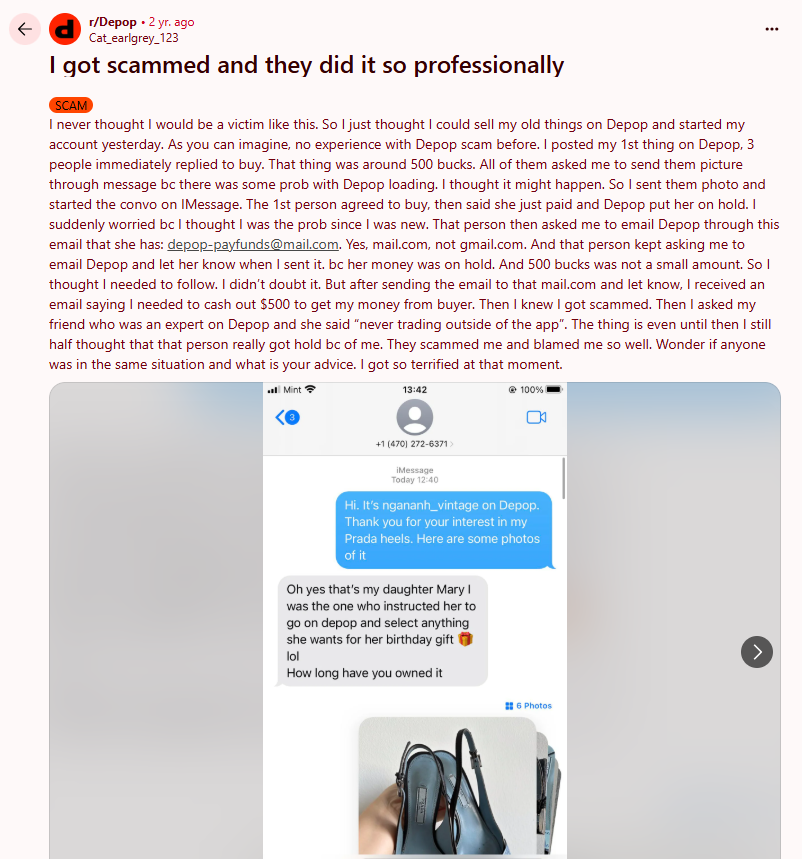
Going off the platform is how both sellers and buyers get scammed.
Depop does not provide protection if a transaction occurs outside its platform.
Depop protection
Depop has a protection program for both buyers and sellers.
Depop protection for buyers
If an item you buy arrives damaged, is not as described, or doesn’t arrive at all, Depop promises a full refund as long as you report the problem within 30 days of purchasing the item.
To qualify for a refund, buyers must have bought the item on the Depop website or app using the “BUY” button.
Items purchased outside the Depop platform, including in-person, are not eligible for a refund.
Depop also says that Depop Protection isn’t necessarily guaranteed. The platform can decide what transactions fall under it.
Depop also says it has the right to “change, suspend, or discontinue the programme at any time, for any reason, and we will not be liable to you for the effect that any changes to the programme may have on you. You have no legal claim under the programme.”
Depop protection for sellers
Depop sellers whose items are lost or damaged in transit may be eligible for Depop Protection.
As is the case for buyers, the transaction has to happen on the Depop platform.
Only sales up to $300 are protected.
Security
In its privacy policy, Depop says, “Once we have received your data, we will use strict procedures and security features to try to prevent unauthorised access.”
It also says you can add an extra layer of protection to your Depop account by turning on two-factor authentication.
On its Google Play page, Depop says its app encrypts data in transit, and users can request that their data be deleted.
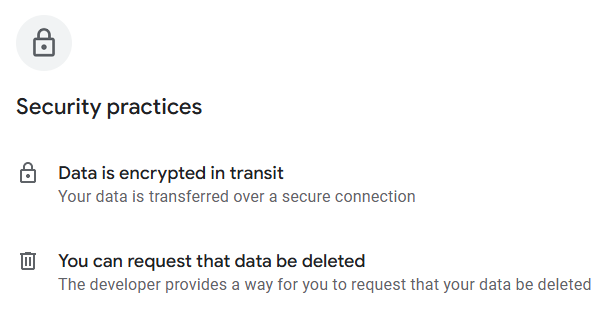
Privacy
Depop explains the kind of personal data it collects, why, and with whom it shares it in its privacy policy.
It collects the following information:
- Contact details and proof of identity: Name, contact details (email, telephone, postal address), date of birth, and identity verification documents if needed.
- Comments and opinions: For example, when you complete a survey, contact Depop, post on community boards, leave comments, etc.
- Competitions and promotions. Contact details and any other information you share as part of the competition entry. If you win the competition, Depop says it can use your data in publicity, including your name, Depop username, likeness, voice, opinions, photos, and biographical information.
- Content and images. Including images containing your personal data. Depop can use this content for online and offline marketing campaigns.
- In-app messages, comments, and item descriptions. Depop may access, store, and review your in-app messages and/or comments.
- Payment and transaction data. Contact details and payment information.
- Social account data. Depop can collect data from any social network accounts you connect. For example, your ID, handle, username, gender, age, language, profile picture, friends list, etc.
- Relationship with other users. Users you follow and users who follow you.
- Website and app login data. Username, password, and device data.
- Device information. Type of device, IP address, internet service provider or mobile network, unique device identifier number, etc.
- How you use the service. Likes, comments, the time you access Depop, for how long, etc.
- Location. If you’ve given your consent, for example, through your device settings.
- Other users. For example, comments and feedback relating to your items.
- Sensitive data. Racial or ethnic origin, religious beliefs, sexual orientation, physical and mental health details, etc. This data is only collected with your consent.
Depop collects this information to provide its services, verify identities, stop fraud, market and advertise, comply with legal and regulatory requirements, and conduct internal business purposes like analytics and research.
It shares this data within the Depop Group and with service providers, advertising partners, and legal and regulatory entities. It will also share it in the case of mergers, acquisitions, or sales.
Data collected (through cookies and similar technologies) is used to show you relevant ads on Depop and third-party websites.
Information about your activity is used for targeted advertising profile building. This may involve sharing certain data with advertising platforms like Facebook, Google, and similar.
Depop warns that your public profile information and any content you share on the platform are visible to other users, as is public activity (e.g., likes, comments, etc.)
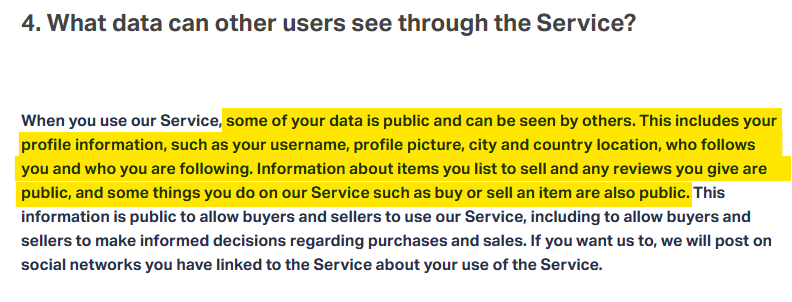
Depop will keep your data for as long as you have an account with it. If you deactivate your Depop account, it will keep your data “for a reasonable period of time afterwards.” It does not specify what this reasonable period might be.
Your data might be stored or processed outside your country of residence (including outside the UK, EEA, or Australia).
So, Should You Use Depop?
Probably.
Depop is seen as a reputable platform for buying and selling fashion items.
However, you should be wary of scams (though this same advice applies to all online marketplaces).
How to Use Depop Safely
- Minimize public details. Only add information to your public profile that’s essential. For instance, while a username and profile picture are required for a Depop account, it’s best to keep other details private.
- Be mindful about what you share. Anything you list, comment on, or post (including photos and descriptions) is public.
- Never leave the platform. Most scams try to get you off the Depop platform, as that way, Depop’s protection program does not protect you. Always complete your transactions on the official Depop website or app.
- Create a strong password. Make sure your Depop account password is unique and doesn’t use any personal information (e.g., date of birth, address, etc.). Don’t reuse it elsewhere online.
- Turn on two-factor authentication. Depop offers two-factor authentication. Turn it on to further protect your account.
- Don’t connect other social profiles. If you do, Depop can receive additional information about you, including your username and friends list.
- Adjust your marketing preferences. You can opt out if you don’t want to receive promotional emails or push notifications from Depop.
- Don’t share unnecessary information with other parties. Depop will share necessary details, like delivery address, as needed to complete a sale. You don’t need to share any additional information, especially outside Depop’s platform.
- Review Depop user profiles. Whether you’re a buyer or seller, always review other users’ profiles before completing transactions.
- Adjust location settings. Your location data helps show items near you but can also be shared. Check and adjust your location permissions in your device settings.
- Exercise your privacy rights. Depending on where you live, you may have privacy rights like the right of access (i.e., see what data Depop has on you) and the right to correct your data. Depop says it may not always be able to comply with your request, but it will give you a reason why it can’t honor it.
- Stay informed. Depop might change its privacy policy periodically – checking it once in a while to see if there have been any updates is a good idea. That said, if Depop makes any material changes to its privacy policy, it will notify users.
Our privacy advisors:
- Continuously find and remove your sensitive data online
- Stop companies from selling your data – all year long
- Have removed 35M+ records
of personal data from the web
Save 10% on any individual and
family privacy plan
with code: BLOG10
news?
Don’t have the time?
DeleteMe is our premium privacy service that removes you from more than 750 data brokers like Whitepages, Spokeo, BeenVerified, plus many more.
Save 10% on DeleteMe when you use the code BLOG10.

















